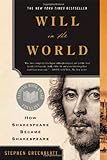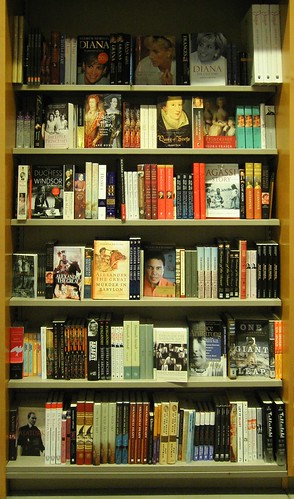 Shakespeare’s life has been the subject of much speculation, particularly because when compared with some writers, there is much we don’t know about it (we actually know more about him than people think, and more than we know about most of his contemporaries). Stephen Greenblatt’s book Will in the World: How Shakespeare Became Shakespeare takes a bit of a different route. Rather than focus only on biographical details, Greenblatt puts Shakespeare in the context of the events that surround him. What did he think of the Earl of Essex’s downfall? How did he feel about King James’s preoccupation with witches and witchcraft? What did he make of fellow writer Robert Greene’s dig (that he had a “Tiger’s heart wrapped in a Player’s hide”)? How did he feel about his wife and daughters? We can’t know the full answers to these questions, but Greenblatt examines the plays for evidence, and a picture of who Shakespeare was and how his world shaped him unfolds in the pages of this book.
Shakespeare’s life has been the subject of much speculation, particularly because when compared with some writers, there is much we don’t know about it (we actually know more about him than people think, and more than we know about most of his contemporaries). Stephen Greenblatt’s book Will in the World: How Shakespeare Became Shakespeare takes a bit of a different route. Rather than focus only on biographical details, Greenblatt puts Shakespeare in the context of the events that surround him. What did he think of the Earl of Essex’s downfall? How did he feel about King James’s preoccupation with witches and witchcraft? What did he make of fellow writer Robert Greene’s dig (that he had a “Tiger’s heart wrapped in a Player’s hide”)? How did he feel about his wife and daughters? We can’t know the full answers to these questions, but Greenblatt examines the plays for evidence, and a picture of who Shakespeare was and how his world shaped him unfolds in the pages of this book.
I especially liked Greenblatt’s commentary on the ways in which Robert Greene may have influenced Shakespeare’s characterization of one of his most memorable characters: Sir John Falstaff. Greenblatt makes a compelling case for Greene as the model of the dissolute knight. Also interesting was some of the speculation about the possibility that Shakespeare’s family were recusants (secret Catholics). Greenblatt’s discussion of the ghost of Hamlet’s father connects to this line of speculation but with a troubling twist that helps explain Hamlet’s inaction much more clearly:
What does it mean that a ghost from purgatory erupts into the world of Hamlet pleading to be remembered? Even setting aside for a moment that purgatory, according to the Protestant church, did not exist, the allusions to it here are an enigma, for spirits in God’s great penitentiary could not by definition ask anyone to commit a crime. After all, they are being purged of their sins in order to ascend to heaven. Yet this ghost is not asking for Masses and alms; he is preempting God’s monopoly on revenge by demanding that his son kill the man who murdered him, seized his crown, and married his widow … Hamlet worries about it, and his paralyzing doubts and anxieties displace revenge as the center of the play’s interest. (320)
Shakespeare’s source material for this play recounts Prince Hamlet’s story quite differently: too young to avenge the death of his father, he feigns madness in order to convince his murderous uncle that he is no threat. Then he waits. When the time is right, he kills his uncle and his uncle’s entire retinue in the best spirit of the adage that “revenge is a dish best served cold.” Shakespeare rightly realizes that carrying out such a story would be impossible on stage, and he makes the conflict more about Hamlet’s inner feelings. The passage above really gave me a new understanding of what is really going on in Hamlet’s mind.
Equally interesting to me were the origins of the witches in Macbeth, in particular, the possibility (strong, given allusions written in the play) that Shakespeare read Reginald Scot’s The Discovery of Witchcraft, a book that challenges Jacobean notions of witchcraft, possibly leading to King James’s decision to have all copies of the book burned.
If I have one major quibble with the book, it is that it becomes bogged down with the language of speculation. Phrases such as “let us imagine,” “perhaps,” “could possibly,” “presumably,” and the like almost start to become distracting, making the book sound like so much speculation. I realize that Greenblatt is merely being careful with language, but his speculation is based on solid historical research, and I wonder if he might not have found a way to express that more clearly.
In all, I believe that James Shapiro’s books A Year in the Life of Shakespeare: 1599 and Contested Will: Who Wrote Shakespeare? were more engaging and focused. In some ways, I think Shakespeare’s story is too big to confine to a single volume, and Shapiro manages to focus on two aspects: one important year in Shakespeare’s life and the authorship controversy. Still, I am glad I read Will in the World, and I have some good information to share with students next time I teach Hamlet or Macbeth.
Rating:







